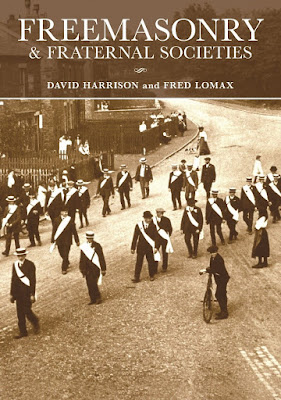Reviews on two books of Dr. David Harrison for Romanian readers
The international Masonic book market abounds in English language editions, and it is quite difficult to identify truly valuable books while sometimes lack the opportunity to browse them. Often, in such cases, they can only be valued in terms of the author's name. David Harrison is a well-known author in the historical world of Freemasonry, due to his resonant work. Precisely for this reason, it deserves to be known to the Romanian's reader also.
"Freemasonry & Fraternal Societies" by David HARRISON and Fred LOMAX
There is no secret that when we are dealing with ritual elements of other Masonic, fraternal or Para-Masonic organizations, it is not easy at all to identify from the beginning of what organization it is. We experience the same situation when we are faced with medals, gifts, and badges of some initiatory organizations that we cannot identify, the subsequent documentation requiring considerable effort and time. David Harrison and Fred Lomax come to our aid by the "Freemasonry and Fraternal Societies." Book.
In this paper, the two authors put together a foray into the history and rituals for over 20 initiatory societies, with a ritual similar to Freemasonry, explaining the differences of rigor, symbolism, but common points with Freemasonry. This excursus into the world of initiatory societies is truly more valuable, even more as a large part of these organizations represent the continuity of medieval guilds, among which was the guild of free masons, the forerunner of Freemasonry that is to say The Operative Masonry.
Among the described fraternal organizations are: The Order of Good Templars, The Ancient Order of the Druids, Ancient Royal Order of Foresters, Oddfellow, Order of Free Gardeners, Order of the Elans, The Ancient Order of Mechanics and more. Some of these initiatory organizations either have once been active on Romanian territory, or they are beginning to gain access at the moment. From this point of view, the work of David Harrison and Fred Lomax is all the more valuable for the Romanian public, who can find all the information summed up in one source. The book has a vast illustrative material of exceptional quality. The work was published by the famous Lewis Masonic Publishing House in Great Britain in 2015.
"The Genesis of Freemasonry" by David HARRISON
Another valuable work by the same author, David Harrison, published by the British Publishing House Lewis Masonic in the first hardcover version in 2009 and followed by two other paperback editions in 2014 and 2016, is "The Genesis of Freemasonry." This paper comes to point out key issues regarding the beginnings of speculative Freemasonry. Initially, the author deals in detail with the period 1640-1717, when it was shaped what we will call today the Speculative Freemasonry.
Harrison describes the elements of operative Freemasonry and the transition from the guild model to the organizational model in which intellectuals, high-ranking nobles, and clergy will have access.
Although several authors have addressed these aspects, few have stopped to debate this difficult period, investigating historical events in terms of connections that could reveal the hidden springs of action that led to the establishment of the Grand Mother Lodge of the World in 1717. Well, David Harrison, not only presents these springs but comes up with historical evidence, some even constituting a premiere, yet avoiding being placed in the category of authors that seeks to make a sensation, thus losing academic credibility.
The author also dwells on the subject of the birth of Modern Freemasonry, namely that stage, perhaps even more obscure than the establishment of the Grand Mother Lodge of the World. Desaguliers' role in this process remains indisputable but still relatively unknown to the Romanian reader, due to the few thematic works in English that have infiltrated the domestic market.
A very important aspect concerns the Rebel Lodges in the British area. If enough ink has been leaked about the conflict between the ancients and the moderns, then almost nothing has been written about the Rebel Lodges. David Harrison comes in to fill the gap left, pointing equidistantly at key issues without hurting any party.
The book benefits from an introductory speech by the director of the Museum of Freemasonry in London, Diane Clements, but also a rich illustrative material from the author's archive. We must mention that David Harrison undertakes research not only in libraries and archives but also in the field, most of the photographs in his books representing images of his investigations in the field, which turns his book into a real journey among the historical vestiges of Freemasonry.




Comentarii
Trimiteți un comentariu